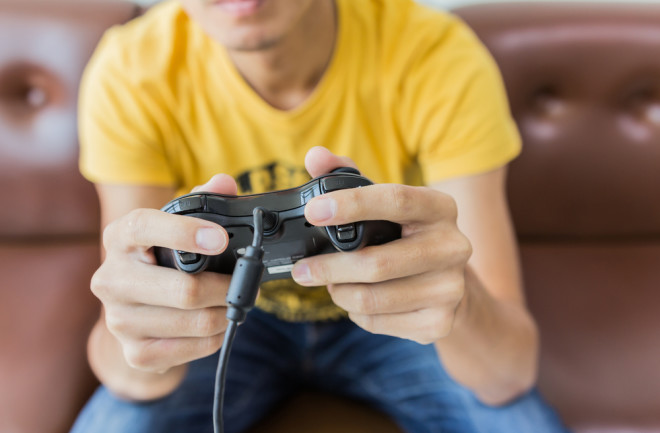This article was originally published on May 20, 2015, but has been updated with recent information.
Video games are a favored target for various kinds of hand-wringing, about things as diverse as obesity, ADHD and violence. In many cases, the evidence is scant. But in others, the evidence is a bit more robust.
Read more: Probing the Complex Influence of Video Games on Young Minds
In 2015, a small study found that people who play action games on a regular basis may undergo brain changes associated with certain kinds of neurological and psychiatric disorders. And this linkage has held up under scrutiny since then, suggesting that gamers could be putting their minds at risk.
For the 2015 study, Gregory West, a professor of psychology at the University of Montreal, and a team of researchers gathered a randomized group of 59 young adults and divided them into two groups based on their gaming habits. One group (26 people) was composed of people who regularly played at least six hours per week of action video games (like Call of Duty, Grand Theft Auto and Tomb Raider), while a second group was composed of those who didn’t.
Then both groups of volunteers were asked to navigate a virtual-reality maze. For the first few runs, the maze contained landmarks, like trees, rocks and some mountains. But after that, the landmarks disappeared, meaning that the volunteers had to navigate the maze from memory.
Overall, gamers and non-gamers were equally adept at navigating the maze, but they reported using different strategies. Eighty percent of video gamers used a response strategy, which means using sequences of turns, rather than environmental cues, to navigate. On the other hand, only 42 percent of non-gamers relied on the same sort of memorized movement sequences.
Ups and Downs
That difference may have implications for gamers’ brains. People who display response learning strategies tend to have a bigger and more active striatum — the part of the brain that links simple stimulus-response-reward sequences together — and a smaller and less active hippocampus, which forms fuller, episodic memories that tie past experiences to their context in terms of time, place or evoked emotion.
Read more: Video Game Addiction Is on the Rise. Here’s What It Looks Like
Playing video games could thus be building up players’ striatum at the expense of their hippocampus. And that has implications for overall brain health, since a shrunken hippocampus is associated with risk of neurological disorders such as Alzheimer’s and schizophrenia, the researchers report in Proceedings of the Royal Society B.
“Older adults use response strategy more and more so, in this sense, video gamers look like older adults,” West told the Guardian.
Brain Changes
Daphne Bavelier, a cognitive neuroscience professor at the University of Geneva who specializes in video game research, says that the chain of reasoning in the study isn't so clear-cut. “There is no evidence in the data they present for a causal link,” she says, “but rather quite a chain of inferences from the behavioral results to the conclusions, not only of a decrease in hippocampal volume, but then also of a risk of developing neurological diseases.”
And the study did not directly measure striatal or hippocampal volume in the volunteers’ brains. But since then, several studies have taken these measurements, finding indications of increased matter and activity in the striatum at the detriment of the hippocampus.
For instance, in another small study from 2017, West and a team scanned the brains of 33 individuals and found that those who played action games for an average of 19 hours a week had less hippocampal volume than non-gamers. And a follow-up study from 2020 found that these gamers also had increased activity in their striatum and decreased activity in their hippocampus when those areas were in a resting, task-neutral state.
Interestingly, this isn’t to say that all video games have negative effects on the hippocampus. Although action games are associated with a reduction in hippocampal volume, West's work has also shown that puzzle and platform games, such as Super Mario, are associated with increased gray matter in the hippocampus.
Plus, different play habits have different effects, with West’s more recent studies suggesting that the reduction in hippocampal volume is predominantly seen in action players who use response strategies as opposed to spatial, relationship-based ones.
Ultimately, in response to the 2015 results, West adds, “I would say play action video games, if you enjoy them, in moderation — just be aware that there may be costs in addition to previously known benefits when it comes to your brain.”
